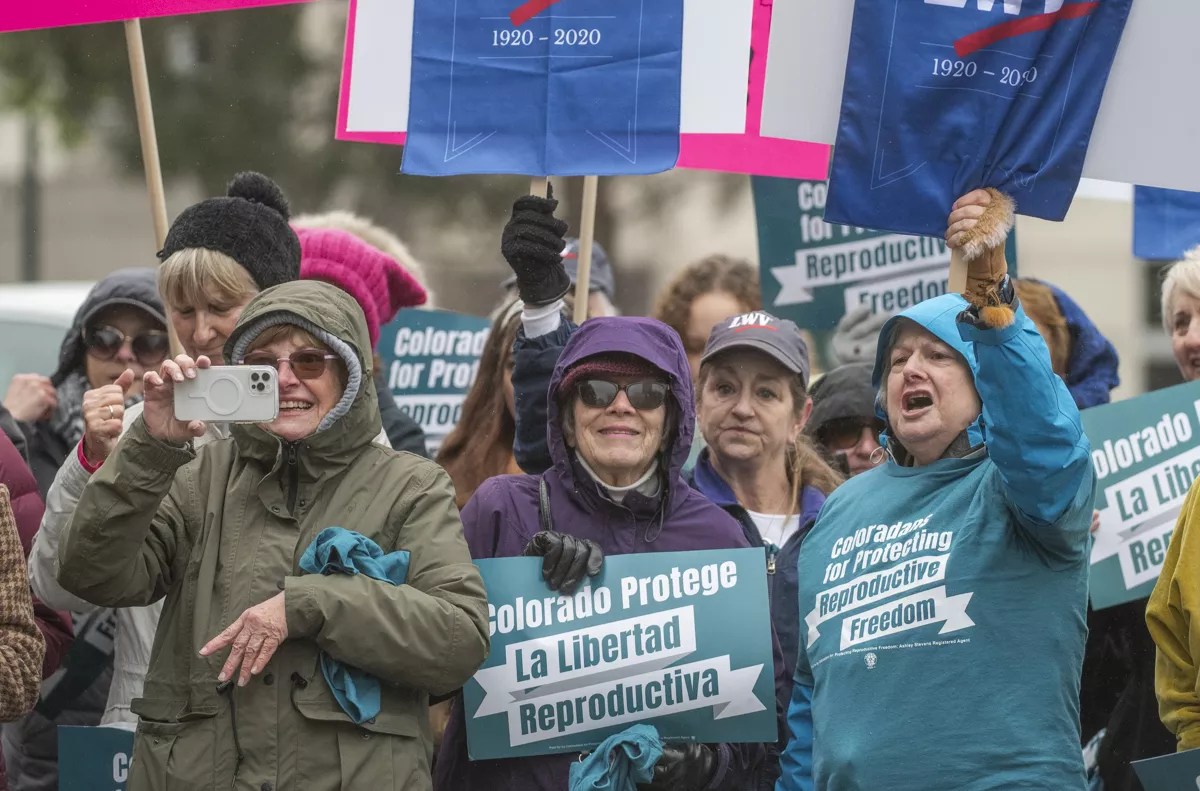
Evan Semón

Audio By Carbonatix
The reproductive rights of Coloradans are once again on the ballot.
This November, ten states will consider ballot measures to expand abortion rights – the most reproductive health-related statewide measures considered in one year – according to the Ballot Initiative Strategy Center. In addition to Colorado, abortion ballot measures will go before voters in Arizona, Florida, Maryland, Missouri, Montana, Nebraska, Nevada and South Dakota.
“Following the Dobbs decision that overturned Roe v. Wade, advocates across the country stepped up and took matters into their own hands in their home states,” said Chris Melody Fields Figueredo, executive director of BISC, during a press conference on Wednesday, October 16. “So far, the fight for reproductive freedom has won every single time that it’s been put before popular vote since that 2022 decision.”
The initiative in Colorado, Amendment 79, asks voters to enshrine the right to abortion in the state constitution.
Colorado already has among the most permissive abortion laws in the country; it is one of 29 states where abortion is broadly legal and one of only a handful with no ban or limit on abortion based on how far along a pregnancy is.
The ballot measure would solidify abortion access even further, enshrining the right in the state constitution so that state legislators could not revoke access to abortion without approval from voters. It would also allow state funds to be used to pay for abortions, including Medicaid and state employee health insurance, which is currently prohibited under a constitutional measure passed in 1984.
“We need to be bold and go as far as we can to ensure that things like this can’t get stripped depending on who’s in office,” said Dusti Gurule, co-chair of the pro-Amendment 79 campaign, Coloradans for Protecting Reproductive Freedom, during Wednesday’s conference. “Even though folks think that Colorado and other states are blue or we have a lot of these things in place already, threats are always there.”

Advocates rally in support of Amendment 79 after submitting signatures to qualify for the ballot.
Evan Semón
State legislators have taken many steps to protect abortion access since the U.S. Supreme Court overturned federal abortion rights and made reproductive freedoms a state issue in 2022. In the past two years, the Colorado Legislature passed bills to establish abortion as a fundamental right, shield patients from out-of-state penalties and expand health insurance coverage for the procedure.
But that hasn’t stopped anti-abortion advocates from pushing back. Last year, Republican state legislators introduced three unsuccessful bills seeking to ban or restrict abortion. Just this week, the Pueblo City Council narrowly voted down an ordinance to restrict abortion access in the city, challenging state law.
Opponents of Amendment 79 lament that it would make it more difficult to ever enact restrictions on abortion in the future, even limited ones.
“It goes far beyond what Roe v. Wade authorized, banning any reasonable limits,” says the Pro Life Colorado Action Fund’s website advocating against the measure. “Colorado already has some of the strongest protections for abortion rights of any state in the nation. … It is too extreme.”
A citizen-initiated proposal to ban abortion failed to qualify for the November ballot, with organizers unable to collect the 124,238 signatures required. (Amendment 79 submitted nearly 240,000 signatures to make the ballot.)
Gurule said access-strengthening efforts like Amendment 79 were inspired by Colorado’s Proposition 115 in 2020, a rejected ballot measure that attempted to prohibit abortions after 22 weeks of gestation.
“It was after that we decided that we were going to be proactive,” Gurule said. “None of this work is easy. Even Democrats, we had to push them to pass the Reproductive Health Equity Act that we did in 2022. We want to put this in our state constitution so that we don’t have to rely on or be worried about who comes into office. This is what the people of Colorado want.”
Amendment 79 requires support from 55 percent of voters to pass because it seeks to amend the state constitution.
Election Day is November 5. Ballots must be mailed to registered voters by October 18. Keep an eye on our Election topic page for all of our latest coverage.